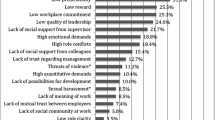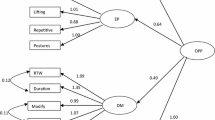Abstract
Purpose
The objective of the present study was to validate a German 11-item organizational justice questionnaire (G-OJQ) that consists of two subscales, referred to as “procedural justice” (PJ) and “interactional justice” (IJ) adapted from Moorman’s organizational justice (OJ) questionnaire. A second objective was to determine associations of the G-OJQ with self-rated health.
Methods
This study used cross-sectional data from an occupational cohort of 1518 factory workers from Germany (87.7 % male; mean age = 38.8 with SD = 11.9). After splitting the sample in two random subsamples, we assessed structural validity by exploratory factor analyses in one subsample and by confirmatory factor analysis in the other subsample. Internal validity was assessed by Cronbach’s α. Associations with self-reported poor health were estimated by logistic regression.
Results
The full scale and its subscales yielded Cronbach’s α’s of ≥0.9, and item-total correlations were ≥0.5. Factor analyses confirmed the expected 2-factor structure, labeled “interactional justice” (IJ, 4 items, λ 0.43–0.94) and “procedural justice” (PJ, 7 items, λ 0.46–0.83), respectively, and showed an acceptable fit to the data (χ 2 = 61; p = .001; CFI = 0.995; RMSEA = 0.037). The OJ total score as well as subscale scores in the lowest quartile, when compared to the highest quartile, was associated with an ≥2.3 increased odds of reporting poor health.
Conclusion
The G-OJQ seems to be a valid and useful tool for observational and intervention studies in occupational settings. Future studies may additionally explore longitudinal associations and test the generalizability of the present findings to other populations and health outcomes.


Similar content being viewed by others
References
Barclay LJ, Skarlicki DP, Pugh SD (2005) Exploring the role of emotions in injustice perceptions and retaliation. J Appl Psychol 90(4):629–643. doi:10.1037/0021-9010.90.4.629
Benyamini Y (2011) Why does self-rated health predict mortality? An update on current knowledge and a research agenda for psychologists. Psychol Health 26(11):1407–1413. doi:10(1080/08870446),2011,621703
Bies RJ, Moag JS (1986) Interactional justice: Communication criteria of fairness. In: Lewicki RJ, Sheppard BH, Bazerman MH (eds) Research on negotiations in organizations, vol 1. JAI Press Inc., Greenwich, Conn., pp 43–55
Cheng Y, Huang H-Y, Li P-R, Hsu J-H (2011) Employment insecurity, workplace justice and employees’ burnout in Taiwanese employees: a validation study. Int J Behav Med 18(4):391–401
Cohen-Charash Y, Spector PE (2001) The role of justice in organizations: a meta-analysis. Organ Behav Hum Decis Process 86:278–321
Colquitt JA (2001) On the dimensionality of organizational justice: a construct validation of a measure. J Appl Psychol 86(3):386–400
Colquitt JA, Conlon DE, Wesson MJ, Porter CO, Ng KY (2001) Justice at the millennium: a meta-analytic review of 25 years of organizational justice research. J Appl Psychol 86(3):425–445
Cooper CL, Williams S (1994) Creating healthy work organizations. Wiley, Chichester
Danna K, Griffin RW (1999) Health and well-being in the workplace: a review and synthesis of the literature. J Manag 25(3):357–384
De Vogli R, Ferrie JE, Chandola T, Kivimaki M, Marmot MG (2007) Unfairness and health: evidence from the Whitehall II Study. J Epidemiol Community Health 61(6):513–518. doi:10.1136/jech.2006.052563
DeJoy DM, Wilson MG (2003) Organizational health promotion: broadening the horizon of workplace health promotion. Am J Health Promot 17(5):337–341
Elovainio M, Kivimaki M, Vahtera J (2002) Organizational justice: evidence of a new psychosocial predictor of health. Am J Public Health 92(1):105–108. doi:10.2105/ajph.92.1.105
Elovainio M, Kivimaki M, Vahtera J, Keltikangas-Jarvinen L, Virtanen M (2003) Sleeping problems and health behaviors as mediators between organizational justice and health. Health Psychol 22(3):287–293. doi:10.1037/0278-6133.22.3.287
Elovainio M, Kivimaki M, Steen N, Vahtera J (2004) Job decision latitude, organizational justice and health: multilevel covariance structure analysis. Soc Sci Med 58(9):1659–1669. doi:10.1016/s0277-9536(03)00366-6
Elovainio M, van den Bos K, Linna A, Kivimaki M, Ala-Mursula L, Pentti J, Vahtera J (2005) Combined effects of uncertainty and organizational justice on employee health: testing the uncertainty management model of fairness judgments among Finnish public sector employees. Soc Sci Med 61(12):2501–2512. doi:10.1016/j.socscimed.2005.04.046
Elovainio M, Kivimaki M, Puttonen S, Lindholm H, Pohjonen T, Sinervo T (2006a) Organisational injustice and impaired cardiovascular regulation among female employees. Occup Environ Med 63(2):141–144. doi:10.1136/oem.2005.019737
Elovainio M, Leino-Arjas P, Vahtera J, Kivimaki M (2006b) Justice at work and cardiovascular mortality: a prospective cohort study. J Psychosom Res 61(2):271–274. doi:10.1016/j.jpsychores.2006.02.018
Elovainio M, Ferrie JE, Gimeno D, De Vogli R, Shipley M, Brunner EJ, Kumari M, Vahtera J, Marmot MG, Kivimaki M (2009) Organizational justice and sleeping problems: the Whitehall II study. Psychosom Med 71(3):334–340. doi:10.1097/PSY.0b013e3181960665
Elovainio M, Ferrie JE, Singh-Manoux A, Gimeno D, De Vogli R, Shipley M, Vahtera J, Brunner E, Marmot MG, Kivimaki M (2010a) Organisational justice and markers of inflammation: the Whitehall II study. Occup Environ Med 67(2):78–83. doi:10.1136/oem.2008.044917
Elovainio M, Heponiemi T, Sinervo T, Magnavita N (2010b) Organizational justice and health; review of evidence. G Ital Med Lav Ergon 32((3 Suppl B)):B5–9
Elovainio M, Singh-Manoux A, Ferrie JE, Shipley M, Gimeno D, De Vogli R, Vahtera J, Virtanen M, Jokela M, Marmot MG, Kivimaki M (2012) Organisational justice and cognitive function in middle-aged employees: the Whitehall II study. J Epidemiol Commun Health 66(6):552–556. doi:10.1136/jech.2010.113407
Ferrie JE, Head J, Shipley MJ, Vahtera J, Marmot MG, Kivimaki M (2006) Injustice at work and incidence of psychiatric morbidity: the Whitehall II study. Occup Environ Med 63(7):443–450. doi:10.1136/oem.2005.022269
Folger R, Greenberg J (1985) Procedural justice: An interpretative analysis of personnel systems. In: Rowland KM (ed) Research in personnel and human resources management, vol 3. JAI Press Inc., Greenwich, Conn., pp 141–183
Fujishiro K, Heaney CA (2009) Justice at work, job stress, and employee health. Health Education & Behavior 36(3):487–504. doi:10.1177/1090198107306435
Gimeno D, Tabak AG, Ferrie JE, Shipley MJ, De Vogli R, Elovainio M, Vahtera J, Marmot MG, Kivimaki M (2010) Justice at work and metabolic syndrome: the Whitehall II study. Occup Environ Med 67(4):256–262. doi:10.1136/oem.2009.047324
Head J, Kivimaki M, Siegrist J, Ferrie JE, Vahtera J, Shipley MJ, Marmot MG (2007) Effort-reward imbalance and relational injustice at work predict sickness absence: the Whitehall II study. J Psychosom Res 63(4):433–440. doi:10.1016/j.jpsychores.2007.06.021
Helkavaara M, Saastamoinen P, Lahelma E (2011) Psychosocial work environment and emotional exhaustion among middle-aged employees. BMC Res Notes 4:101. doi:10.1186/1756-0500-4-101
Inoue A, Kawakami N, Tsutsumi A, Shimazu A, Tsuchiya M, Ishizaki M, Tabata M, Akiyama M, Kitazume A, Kuroda M, Kivimaki M (2009) Reliability and validity of the Japanese version of the organizational justice questionnaire. J Occup Health 51(1):74–83
Jaffe DT (1995) The healthy company: research paradigms for personal and organizational health. In: Sauter SL, Murphy LR (eds) Organizational risk factors for job stress. Am Psychol Assoc, Washington, pp 13–39
Kawachi I (2006) Injustice at work and health: causation or correlation? Occup Environ Med 63(9):578–579. doi:10.1136/oem.2006.028365
Kivimaki M, Elovainio M, Vahtera J, Ferrie JE (2003a) Organisational justice and health of employees: prospective cohort study. Occup Environ Med 60(1):27–33 (Discussion 33-24)
Kivimaki M, Elovainio M, Vahtera J, Virtanen M, Stansfeld SA (2003b) Association between organizational inequity and incidence of psychiatric disorders in female employees. Psychol Med 33(2):319–326
Kivimaki M, Ferrie JE, Head J, Shipley MJ, Vahtera J, Marmot MG (2004) Organisational justice and change in justice as predictors of employee health: the Whitehall II study. J Epidemiol Community Health 58(11):931–937. doi:10.1136/jech.2003.019026
Kivimaki M, Ferrie JE, Brunner E, Head J, Shipley MJ, Vahtera J, Marmot MG (2005) Justice at work and reduced risk of coronary heart disease among employees: the Whitehall II Study. Arch Intern Med 165(19):2245–2251. doi:10.1001/archinte.165.19.2245
Kivimaki M, Vahtera J, Elovainio M, Virtanen M, Siegrist J (2007) Effort-reward imbalance, procedural injustice and relational injustice as psychosocial predictors of health: complementary or redundant models? Occup Environ Med 64(10):659–665. doi:10.1136/oem.2006.031310
Kivimaki M, Ferrie JE, Shipley M, Gimeno D, Elovainio M, de Vogli R, Vahtera J, Marmot MG, Head J (2008) Effects on blood pressure do not explain the association between organizational justice and coronary heart disease in the Whitehall II study. Psychosom Med 70(1):1–6. doi:10.1097/PSY.0b013e31815aaca3
Kouvonen A, Vahtera J, Elovainio M, Cox SJ, Cox T, Linna A, Virtanen M, Kivimaki M (2007) Organisational justice and smoking: the Finnish public sector study. J Epidemiol Community Health 61(5):427–433. doi:10.1136/jech.2007.061739
Kouvonen A, Kivimaki M, Elovainio M, Vaananen A, De Vogli R, Heponiemi T, Linna A, Pentti J, Vahtera J (2008) Low organisational justice and heavy drinking: a prospective cohort study. Occup Environ Med 65(1):44–50. doi:10.1136/oem.2007.032755
Leventhal GS (1980) What should be done with equity theory? New approaches to the study of fairness in social relationship. In: Gergen K, Greenberg M, Willis R (eds) Social exchange: advances in theory and research. Plenum Press, New York, pp 27–55
Liljegren M, Ekberg K (2009) The associations between perceived distributive, procedural, and interactional organizational justice, self-rated health and burnout. Work 33(1):43–51. doi:10.3233/WOR-2009-0842
Moorman RH (1991) The relationship between organizational justice and organizational citizenship behavior: do fairness perceptions influence employee citizenship? J Appl Psychol 76:845–855
Thibaut JW, Walker L (1975) Procedural justice: a psychological analysis. L. Erlbaum Associates; distributed by the Halsted Press Division of Wiley, Hillsdale, New York
WHO (2000) Obesity: preventing and managing the global epidemic. Technical Report Geneva
Winter AC, Hoffmann W, Meisinger C, Evers S, Vennemann M, Pfaffenrath V, Fendrich K, Baumeister SE, Kurth T, Berger K (2011) Association between lifestyle factors and headache. J Headache Pain 12(2):147–155. doi:10.1007/s10194-010-0286-0
Ylipaavalniemi J, Kivimaki M, Elovainio M, Virtanen M, Keltikangas-Jarvinen L, Vahtera J (2005) Psychosocial work characteristics and incidence of newly diagnosed depression: a prospective cohort study of three different models. Soc Sci Med 61(1):111–122. doi:10.1016/j.socscimed.2004.11.038
Conflict of interest
The authors declare that they have no conflict of interest.
Author information
Authors and Affiliations
Corresponding author
Rights and permissions
About this article
Cite this article
Herr, R.M., Li, J., Bosch, J.A. et al. Psychometric properties of a German organizational justice questionnaire (G-OJQ) and its association with self-rated health: findings from the Mannheim Industrial Cohort Studies (MICS). Int Arch Occup Environ Health 87, 85–93 (2014). https://doi.org/10.1007/s00420-012-0839-4
Received:
Accepted:
Published:
Issue Date:
DOI: https://doi.org/10.1007/s00420-012-0839-4




